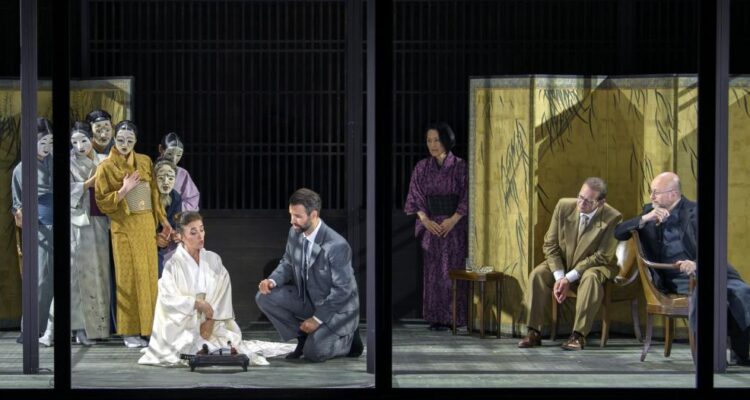Puccini is not frequently performed at the Festival d’Aix-en-Provence, having only made his debut with Tosca in 2019. This 2024 edition commemorates the composer’s 100th death anniversary with a new production of Madama Butterfly directed by Andrea Breth.
Breth astutely notes that Puccini was unfamiliar with Japanese culture, having never visited the country. Consequently, Madama Butterfly presents a Western interpretation of Japanese life and customs through the lens of early 20th-century Italy, blending authentic and stereotypical elements. Based on this perspective, Breth envisions a stereotypical setting inspired by 19th-century photographs of Japan, akin to a still life. The stage features a stylized Japanese home with a few yellow-painted screens and sparse objects scattered around. Additionally, masks from Japanese theatre represent Butterfly’s family, and Japanese characters sometimes cross the stage on a conveyor belt.
Unfortunately, these devices do not contribute to a visually appealing staging, which remains generally dull. Furthermore, the stillness of the Japanese characters diminishes the intensity of many crucial passages, especially in the first act. The disownment of Butterfly by her uncle Bonzo and the crowd of relatives at Butterfly’s wedding go almost unnoticed. Little happens on the Western front either; during the first act, the Americans sit comfortably, sipping whisky, oblivious to the excitement of the wedding. The static approach works better in the final act, where Butterfly’s pain is amplified by the stillness of the other characters. However, it seems that something other than Puccini’s intentions is in the director’s mind.
Despite the simplicity of the story, Madama Butterfly contains many layers, including cultural misunderstandings, the limited role of women in a patriarchal society, and Butterfly’s desire to build a different life for herself and her son. None of these themes are adequately highlighted.
The cast, overall, disappoints. Adam Smith delivers a detached Pinkerton; his vocal performance is underwhelming, and his stage presence is rigid. Lionel Lothe, in the role of Sharpless, is more empathetic, especially during the second act when reading Pinkerton’s letter to Butterfly. Mihoko Fujimura appears ill at ease as Suzuki and shows little sympathy for Butterfly’s pain.
The only exception is the performance of Ermonela Jaho as Cio-Cio-San. The Albanian soprano rescues the evening with her brilliant transition from a naïve teenage geisha to a tragic heroine. Her voice, though not particularly powerful, imbues Madama Butterfly with intense lyricism, capturing both the strength and the fragility of the character.
The orchestra, under the conduction of Daniele Rustioni, seems flabby. There is no tension, no particularly strong emotions emanating from the pit, and, at times, it appears out of sync with the action on stage.
The only compelling reason to see this opera is Ermonela Jaho’s exceptional performance. Otherwise, the festival program offers more intriguing choices.
Théâtre de l’Archevêché, Festival d’Aix-en-Provence
Opera
By Giacomo Puccini
Libretto: Luigi Illica, Giuseppe Giacosa
Conductor: Daniele Rustioni
Director: Andrea Breth
Cast includes: Ermonela Jaho , Adam Smith, Lionel Lothe , Mihoko Fujimura, Carlo Bosi
Orchestra and choir: Orchestre de l’Opéra de Lyon
Théâtre de l’Archevêché, Aix-en-Provence, France
Until the 22nd of July 2024

